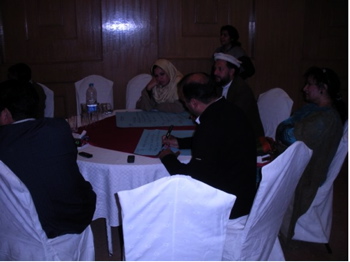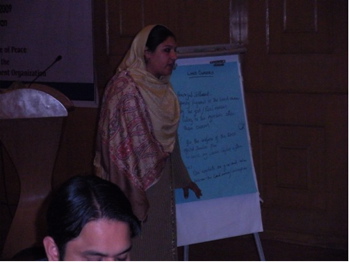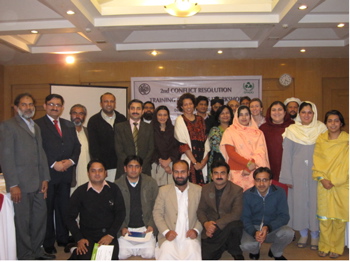ETC/I Senior Program Officers Nina Sughrue and Linda Bishai, in conjunction with local partner the Sustainable Peace and Development Organization (SPADO), conducted the second training of trainers (TOT) workshop in conflict analysis and resolution in Islamabad on December 13-15, 2009.
Posted: December 13, 2009
 ETC/I Senior Program Officers Nina Sughrue and Linda Bishai, in conjunction with local partner the Sustainable Peace and Development Organization (SPADO), conducted the second training of trainers (TOT) workshop in conflict analysis and resolution in Islamabad on December 13-15, 2009. In this session, participants discussed how they have been using the materials taught during the first USIP workshop, held in August 2009, to help resolve conflicts and solve problems in their local communities in the North-West Frontier Province (NWFP) and in the Federally Administered Tribal Areas (FATA) of Pakistan.
ETC/I Senior Program Officers Nina Sughrue and Linda Bishai, in conjunction with local partner the Sustainable Peace and Development Organization (SPADO), conducted the second training of trainers (TOT) workshop in conflict analysis and resolution in Islamabad on December 13-15, 2009. In this session, participants discussed how they have been using the materials taught during the first USIP workshop, held in August 2009, to help resolve conflicts and solve problems in their local communities in the North-West Frontier Province (NWFP) and in the Federally Administered Tribal Areas (FATA) of Pakistan.
Building on the August workshop, we divided the 42 Pakistani trainers into seven groups and asked to them put together modules on one of six topics covered in the August workshop: conflict analysis, communication skills, conflict styles, negotiation, mediation, and problem solving.
The seventh group was responsible for coordinating with the other six groups and putting the agenda together, including alloting appropriate time and maintaining the schedule throughout the three days of the workshop. In this format, the participants presented their modules to each other - essentially training each other in a blend of USIP methodology and traditional Pakistani conflict resolution mechanisms.
throughout the three days of the workshop. In this format, the participants presented their modules to each other - essentially training each other in a blend of USIP methodology and traditional Pakistani conflict resolution mechanisms.
Sughrue and Bishai provided feedback to the groups based on the content of their work, the level of participation of all of the group members, and on their training techniques. The groups incorporated real Pakistani problems as examples to complement the USIP methodology. As many participants are now working in the Swat Valley in humanitarian roles, conflicts in this particular region of the NWFP were emphasized. Additionally, tensions between the Pakistan Army and the NGO community were highlighted as an overall problem that participants were managing. Groups used a mix of lecturing, interactive presentation, and group work in their training modules.
The participants appreciated the opportunity to train one another in these critical skills of peace. Additionally, they were eager to continue to improve their teaching techniques in these conflict resolution tools. They requested additional training in dialogue and facilitation techniques as many of them are conducting dialogues in some of the most troubled regions in Pakistan.
were eager to continue to improve their teaching techniques in these conflict resolution tools. They requested additional training in dialogue and facilitation techniques as many of them are conducting dialogues in some of the most troubled regions in Pakistan.
ETC/I plans to continue its work with this network of conflict management trainers in 2010.



